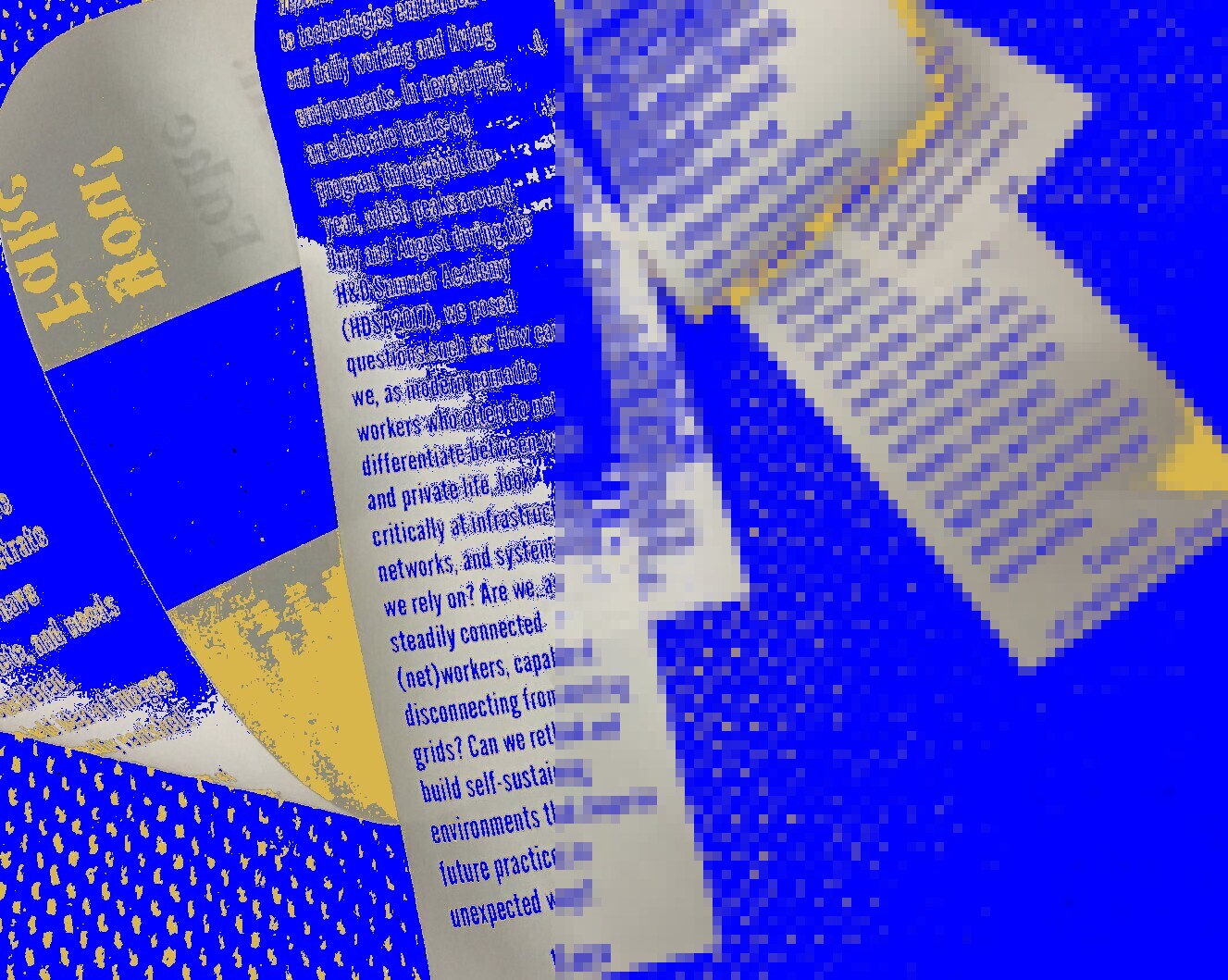Self-organized: alternative economies
| Self-organized: alternative economies | |
|---|---|
| Name | Self-organized: alternative economies |
| Location | de appel |
| Date | 2024/11/09 |
| Time | 14:00-17:00 |
| PeopleOrganisations | Kate Rich, Benjamin Earl, Kuba Szreder |
| Type | [[]] |
| Web | Yes |
| Yes | |
A meet-up series about self-organization
We are inviting you to the third of a series of informal [re]work sessions that explore how self-organized communities involved with cultural work continue to develop and sustain themselves. We are particularly interested in exploring together with peers actionable tools that enable and/or hinder our collective work.
The three thematic [re]work sessions are roughly dedicated to {(1)} administration of care related to different cooperative models, {(2)} intersectional inspections of [digital] infrastructural labor organization and {(3)} development of terms and conditions toward alternative economies.
[Re]work session {(3)}: Self-organized: alternative economies
Join us on Saturday November 9 at the de appel, Tolstraat 160 1074 VM Amsterdam, for our third [Re]work session.
During this session, we invited guests from different collectives to reflect on the session's theme through their personal experiences, approaches and modalities of their work within/as collectives and alternative economies. We would like to imagine together different ways of configuring labor, care and infrastructure that nourish communities and strengthen allied networks.
We'd like to invite collectives and individuals to join in on the conversation that feel connected to this topic and have specific cases they'd like to bring to the table.
Guests
Kate Rich
Kate Rich is a trade artist and feral economist, born in Australia and living in Bristol UK. She is co-founder of the Bureau of Inverse Technology (BIT), an international agency producing an array of critical information products including economic and ecologic indices, event-triggered webcam networks and animal operated emergency broadcast devices. The Bureau’s work has been exhibited in academic, scientific and museum contexts. Since 2003 she has run Feral Trade, a long-range economic experiment and underground freight network, utilising the spare carrying capacity of the art world for the transportation of other goods, specifically groceries. Kate is volunteer finance manager at Bristol’s artist-run Cube Microplex, system administrator for the Irational.org art-server collective and a founding member of the European Sail Cargo Alliance. Her ongoing preoccupation is to move deeper into the infrastructure of trade, administration, organisation and economy in the cultural realm. She is currently testing out curriculum for the Feral MBA, a radically different kind of business school where artists, business operators and other researchers would gather to experiment with new shapes for business and enterprise for a fundamentally reimagined economy.
Benjamin Earl
Benjamin Earl is a Designer and Artistic Technologist with an interest in the digitisation of everyday life, the rendering and simulation of physical environments, and digital communication and knowledge sharing practices. His work involves looking closely at the material and tangible ruptures of digital culture whilst simultaneously trying to imagine new ways of computing that can be contextual, situated and relational. He is part of several self-organized collectives and creative communities that such as Varia, Good Times Bad Times, and Extra Practice Studio.
Kuba Szreder
Kuba Szreder is a lecturer at the department of art theory at the Academy of Fine Arts in Warsaw. Graduate of sociology at the Jagiellonian University (Krakow), he received PhD from the Loughborough University School of the Arts. He combines practice-based research with curating interdisciplinary projects and political engagement. He has worked with many artistic institutions and collectives in Europe. In 2009 he co-initiated Free / Slow University of Warsaw, with which he completed several inquiries into the political economy of contemporary artistic production, such as Joy Forever: Political Economy of Social Creativity (2011) and Art Factory. Division of labor and distribution of resources in the field of contemporary art in Poland (2014). In 2010 he started to cooperate with Critical Practice, a London-based research cluster, with which he conducted several research projects about the modes of being in public (2010-2011), and the social process of evaluation (2012-2016). Since 2012 he has worked with the Citizens Forum for Contemporary Art in Poland, with which he has campaigned for the betterment of conditions of work in the sector of contemporary art. In 2018 together with Kathrin Böhm he co-initiated the Centre for Plausible Economies, a research cluster devoted to reimagining economy by using artistic means. In 2020 he co-established the Office for Postartistic Services, the aim of which is to employ artistic competences in support of progressive social movements. He is editor and author of several catalogues, books, readers, chapters, essays and articles, devoted to social, economic, and theoretical aspects of the contemporary art. Current research interests include interdependent curating, new models of artistic institutions, postartistic theory and practice. His book The ABC of the Projectariat was published in 2021 by the Manchester University Press. (2021)
Time table
14.00 Welcome and introduction by H&D
14.10 Introduction round of participants
14.30-15.30 Presentations
14.30 Kate Rich
14.50 Benjamin Earl
15.10 Kuba Szreder
15.30 Short break
15.45 Collective exercise 'pod-mapping,' individually and in pairs to discuss
16.30 Regroup & conversation
17.00 End
Sign-up
This session is co-organized with Platform BK. Please find information about signing up on platformbk.nl/en/collaboration-station-day-2/
Accessibility
The session is taking place in person at de appel, which has some limitations when it comes to physical accessibility. Please send us an email to share with us what your access needs are so we can do our best to reduce barriers.
The session will be held in English. A live transcription and translation to Dutch will also be made available to listeners.
Code of Conduct
Please consult the Hackers & Designers Code of Conduct before joining the event in person.
Documentation
Photos and an audio recording of the session will be made available here shortly after it takes place. Here is the bi-lingual transcript of the sessions.
